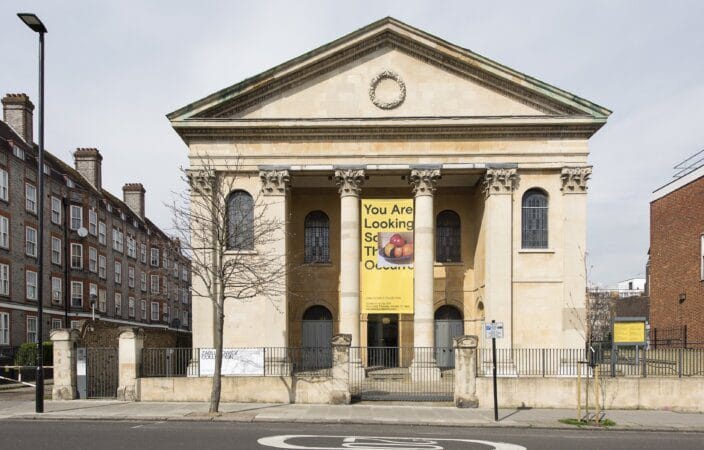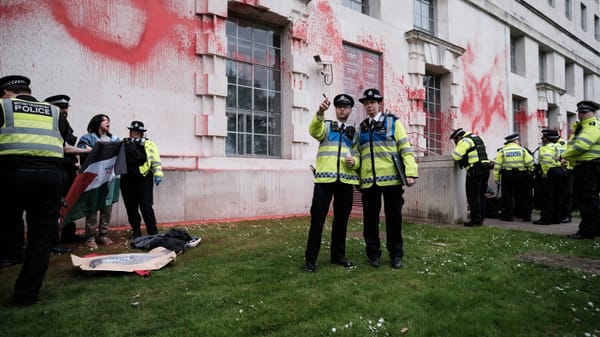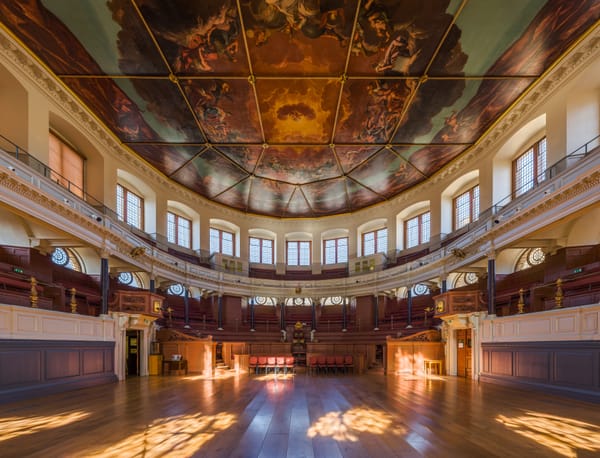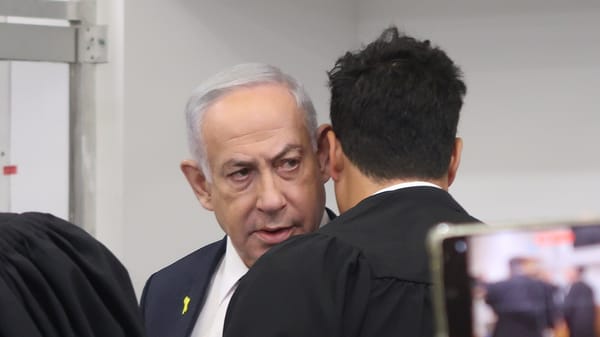Boycott Zabludowicz
Why are artists boycotting these Jewish collectors?

During her 2019 show at Tate Britain, the sculpturist Jesse Darling received the kind of offer most artists dream of receiving. It was from the Zabludowicz Collection, a private art collection renowned in the industry, offering to fund the acquisition of one of her sculptures. Darling turned it down..
The Zabludowicz collection is housed inside a 19th-century former Methodist church in north west London. It’s a grand building: carved out of yellow Oxford stone, the entrance framed by Corinthian columns. Showcasing contemporary art by emerging artists, the collection was founded in 2007 by Finnish-born British billionaire Poju Zabludowicz and his wife, the prominent art collector Anita Zabludowicz.
The collection is known for buying up young artists' work and opening doors to much bigger institutions – institutions such as the Tate where, thanks to sizeable donations made by the family. Anita is an honorary member of the Tate Foundation, an advisory board and membership body made up of people with the capital to fund “acquisitions, exhibitions, learning, research, conservation and capital projects” (in a statement to Vashti, a Tate spokesperson said “honorary membership of Tate Foundation [is] given in recognition of previous donations and does not have any governance or decision-making remit”). The family’s influence in the art world is heritable, it appears: Pojo and Anita’s daughter Tiffany is an influential collector and curator in her own right, with a Times Square gallery which primarily supports emerging artists.
Darling benefited from the exposure that association with the family can provide: she previously exhibited with the Zabludowiczes – that is, before she found out about the Boycott Zabludowicz Campaign (BDZ). Part of the Palestinian Campaign for the Academic and Cultural Boycott of Israel, BDZ calls for artists to boycott the Zabludowicz Collection and Zabludowicz Trust, the arts and cultural fund through which the family acquires artists’ work – on the grounds that the family is complicit in Israeil apartheid.
Poju Zabludowicz’s family made its fortune through the holding company Tamares Group that Poju has directed since 1990. As the first outside investor, Tamares has significant capital in Palantir Technology, the private data processing company used by the Israeli government to profile Palestinians based on their social media history. Since October 2015, more than 200 Palestinians have been arrested for incitement on social media, according to the Israeli newspaper Haaretz. These arrests, it adds, have been made possible by “analyzing social media posts” for people who fit a “terrorist profile”.
Tamares is also an investor in Knafaim Holdings, an aviation company with a contract to maintain aircraft for the Israeli Air Force.
Poju, meanwhile, is one of the founders of and major donors to Bicom, the British Israel Communication and Research Centre whose role, the Jewish Chronicle notes, “has largely been to counter anti-Israel propaganda and negativity in the media and the political arena”.
On the campaign’s website, BDZ “demands that […] the Zabludowicz Art Trust publicly recognise the rights of Palestinians, and desist from all activities and investments supporting the state of Israel in maintaining an oppressive system of apartheid”.
BDZ has gained significant momentum since its launch in 2014, culminating last year when 25 artists and cultural workers simultaneously disaffiliated from the past work they had exhibited at the Zabludowicz Collection.
The collection did not respond to Vashti’s request for comment.
Despite the family’s manifold implication in Israeli apartheid, the boycott has not always been an easy sell to young artists desperate for a leg up in a brutal industry – and an even harder sell among decision-makers in the art world. According to a survey by Arts Professional magazine, 73% of arts organisation employees consider their employer to be at reputational risk through association with controversial donors. Things may be changing, though.
Earlier this year, the Tate removed all references in its London galleries to the Sackler family after a settlement was reached in a court that accused them of fuelling the US Opioid epidemic (through misbranding OxyContin) that kills hundreds of thousands of Americans each year. Galleries are also beginning to wake up to the situation in Israel and Palestine: in 2019 the BDS boycott of the Whitney Biennial on account of board members investments in weaponry forced Warren Kanders – who part-owns a company that produces tear gas and bullets used in Gaza and on the Mexican-US border – to resign from the museum board.
Meanwhile, galleries like the Tate continue to work with the Zabludowiczes – perhaps because, unlike the Whitney, they exhibit primarily dead artists who cannot threaten to pull their work on the grounds of BDS.
Speaking to Vashti on condition of anonymity, someone who previously worked in the UK art sector said that, particularly in an inhospitable economic climate, the threshold for divestment was high.
“The arts are always the first thing to [be] cut [by the government]. So […] philanthropic donations from unsavoury characters has been the most kind of secure way to make sure that the arts can be free for everyone going forward.”
“In terms of the Israel boycott stuff”, they added, “that isn't something museums would even consider”.
A spokesperson for the Tate said that “all major donations to Tate are reviewed by an independent Ethics Committee”.
There may be other reasons why the Tate may be reluctant to divest from the Zabludowiczes. In an article on the BDZ campaign published on the art blog White Pube in 2021, critic Zarina Muhammad writes that some people might be concerned that as “a cultural organisation […] if we implement a boycott policy, it’ll look like institutional antisemitism”. Such concerns feel particularly pertinent in the context of the BDS bill.
First proposed by Boris Johnson as a last-minute Jewish vote-clincher in the run-up to the 2019 election and confirmed in this year’s Queen’s speech, the bill would prevent public bodies such as the Tate from participating in boycotts on the grounds that they “undermine community cohesion”. Tory MPs like Eric Pickles, Priti Patel and Robert Jenrick have all previously claimed that BDS as anti-semitic. This characterisation of BDS, and attempts to legislate against it, have been staunchly opposed by a number of civil society groups both secular and Jewish.
Earlier this year, the Right to Boycott coalition published an open letter, stating: “[T]his law will stifle a wide range of campaigns [and threatens] democratic institutions [decision making capacity] to spend, invest and trade ethically in line with international law and human rights.”
The BDS bill is also facing resistance from the Jewish left, among them members of Jewish Solidarity Action and Na’amod who earlier this year dropped a banner from Westminster bridge reading “Jews In Solidarity With Palestinians: Defend Democracy! Oppose The Anti-Boycott Bill!”
“Jewish people historically have been both targets of, and participated in, boycotts and other forms of protest,” wrote activist Tamara Stanton in Huck Magazine shortly after the action. “In staging this intervention, we reject the government’s use of anti-semitism as a justification for criminalising the right to boycott”.▼
Bella Saltiel is a freelance journalist based in London.





